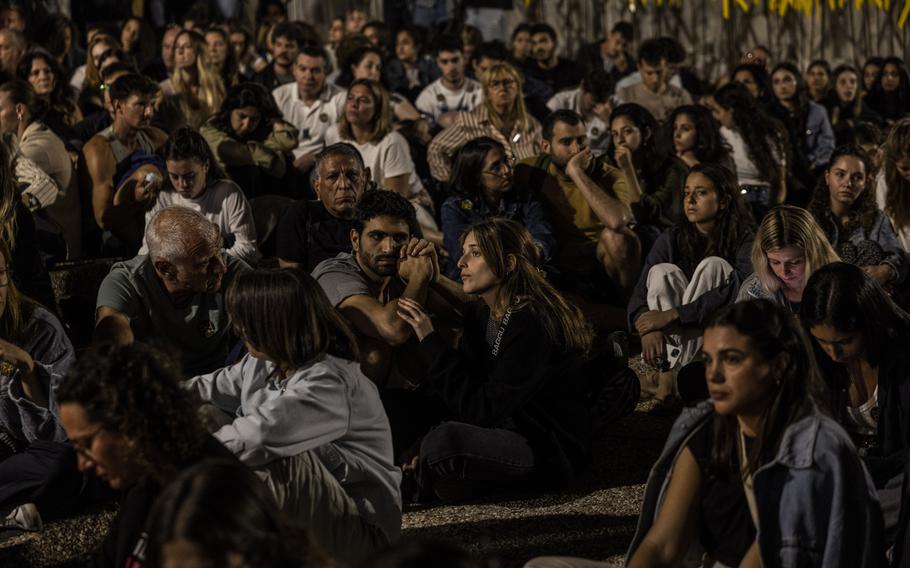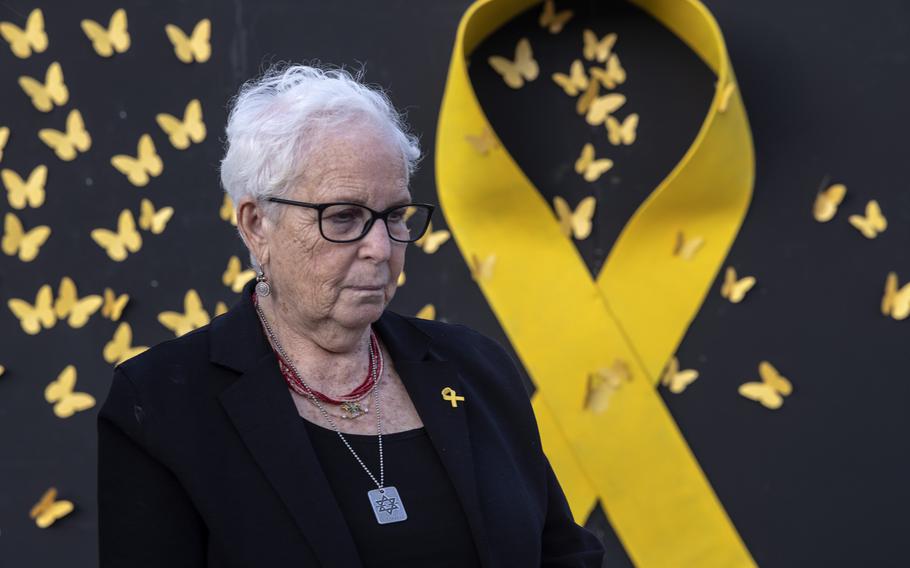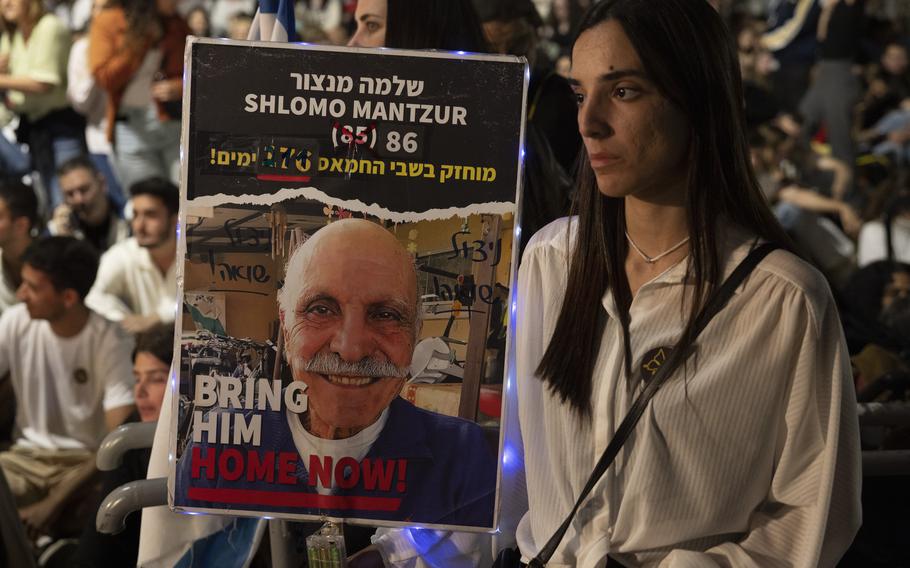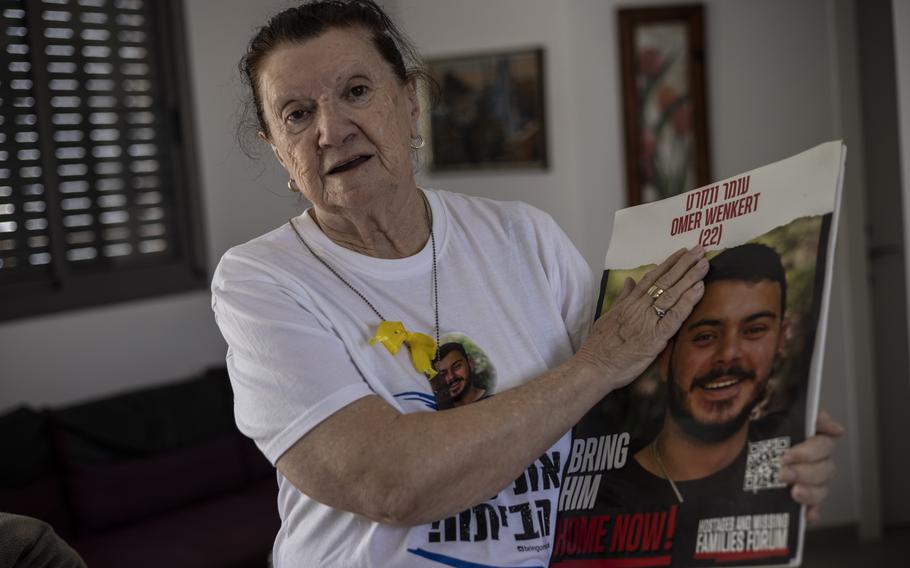
On the eve of Holocaust Remembrance Day, Israelis attend an event Sunday, May 5, 2024, in Tel Aviv with family members of hostages being held in Gaza. (Heidi Levine/for The Washington Post)
TEL AVIV — Soon after Hannah Gofrit, an 88-year-old Holocaust survivor from Poland, grasped the scope of the Oct. 7 atrocities, she sought out the young people who hid in safe rooms, in bushes, under tanks, under bodies, behind any makeshift cover they could find that day to save their own lives.
Eight decades ago, she, too, hid in an underground potato shed and in the closets of neighbors to escape the Nazis. When she met with children from Kibbutz Mefalsim, one of the 22 communities near the Gaza border ravaged during the assault, she told them that they were not alone, and that this trauma also could be overcome.
“The children asked me how I survived, and I told them: ‘Just like you. I hid, with my mother, and wasn’t it good to feel your mother’s clothes, to smell your mother’s smell, while what was happening happened outside?’” she recalled.
Last week, she told a group of survivors of the Nova rave party, where 360 people were slaughtered and 40 others were dragged into Gaza on Oct. 7, that “the images, those horrors will stay with you in the night, but the question is, ‘What do you do when you wake up?’ ”
On Sunday night, on the eve of Holocaust Remembrance Day, she told hundreds of hostage families and their supporters who packed into the central Tel Aviv plaza now known as Hostage Square that she was waiting with them for the return of the hostages, and that the nation would one day begin to heal.
“I thought that we would never again be victims,” Gofrit said as she prepared to go onstage. She said that her role as an educator and survivor has changed since Oct. 7, as she faced “audiences that are thirsty” for optimism.

Holocaust survivor Hannah Gofrit stands next to an installation of a yellow ribbon with butterflies Sunday, May 5, 2024, in Tel Aviv on the eve of Holocaust Remembrance Day. (Heidi Levine/for The Washington Post)
Holocaust Remembrance Day, an Israeli national holiday, stretches from sundown Sunday to sundown Monday. It is the first of a string of holidays over the next two weeks that are overshadowed by the Oct. 7 attacks — the deadliest assault in Israeli history and the most recent formative tragedy to befall the Jewish people since the Holocaust.
Next week will be Memorial Day and Independence Day, which are expected to surface long-simmering controversies over the handling of the war. Israeli Prime Minister Benjamin Netanyahu and his far-right coalition maintain that, above all, Hamas must be destroyed, while hostage families and their supporters say the priority must be the return of their loved ones.
On Sunday, hundreds of Holocaust survivors gathered with younger generations to share their testimonies, in living rooms and public spaces around the country, as part of a 13-year-old initiative that was originally envisioned as a means of keeping their stories alive as the survivor population dwindles.
But on Monday, as the blare of sirens brought Israelis to a standstill, the directive to “Never Forget” — said of the Holocaust, and of Oct. 7, and in some cases both — was imbued with new, more urgent relevance, according to Israeli survivors.
“It is not simple, this forging of connecting between this screaming present,” of the hostages, whose families have for seven months been clamoring for their release, “and the memory of our grandparents, who require us to be worthy of their memory,” said Benny Lau, a prominent rabbi who hosted the Hostage Square Holocaust Remembrance Day event.
Survivors and their hundreds of thousands of grandchildren in Israel say that the current situation feels like the Holocaust.
“I feel like we are living in something we might call an ‘October Holocaust,’ ” said Omri Shtivi, whose brother Idan, a 28-year-old environmental sciences student from Tel Aviv, was kidnapped from the Nova party. Omri said that both their grandparents were Holocaust survivors and that the testimonies he discovered in anticipation of the holiday were “chilling” in their relevance.
“This is a much lower scale, but I think that anyone who has seen the pictures from that Saturday cannot call it anything else,” he said.
Israel is home to 133,000 Holocaust survivors, some 2,000 of whom were evacuated from their homes because of the war in Gaza, according to Israel’s Ministry of Welfare and Social Affairs.
On Monday, their plights and their names are being remembered as the war in Gaza could be entering a new phase. Negotiations for a cease-fire and hostage release deal are again at an impasse. On Sunday, Hamas launched a rocket attack on the Kerem Shalom border crossing, one of the few land routes for the delivery of humanitarian aid into the Strip, killing four Israeli soldiers.

A family member holds a poster of an 86-year-old who is the oldest hostage held by Hamas, in Tel Aviv on Sunday, May 5, 2024. (Heidi Levine/for The Washington Post)
There are 132 hostages still inside Gaza, most of whom Israel believes to be held in homes and subterranean tunnels in Rafah, the southern city that Israel has pinpointed as its final battlefield. On Monday, Israel issued evacuation orders to some 100,000 residents of Rafah, potentially signaling that a ground incursion is imminent. More than 34,000 people have been killed in Gaza since the start of the war, mostly women and children, according to the Gaza Ministry of Health, which does not distinguish between combatants and civilians.
The International Criminal Court in The Hague is rumored to be preparing arrest warrants for senior Israeli government and military officials, including Netanyahu, over their conduct of the war. The International Court of Justice, a separate body, is also considering a case brought by South Africa accusing Israel of carrying out genocide in Gaza.
Israel has categorically denied the accusations, saying that its military takes measures to protect civilian life and that the war is necessary for the country’s survival.
“Eighty years ago, in the Holocaust, the Jewish people were totally defenseless against those who sought our destruction. No nation came to our aid,” Netanyahu said Sunday night, speaking in English at the official opening Holocaust Remembrance Day ceremony at Yad Vashem in Jerusalem, where an empty yellow chair was reserved as a gesture of solidarity with the hostages in Gaza.
“I say to the leaders of the world — no amount of pressure, no decision from any international forum will stop Israel from defending itself,” he added, apparently referring to the ICC proceedings and the international critics of the war in Gaza. “We will defeat our genocidal enemies. Never again is now.”
Zili Wenkert, 88, who survived the Transnistria concentration camp and whose 22-year-old grandson, Omer, is a hostage in Gaza, said she felt “enormous disappointment” at the Israeli war aim to annihilate Hamas.
“I’m not a military person, but I know that the first thing that they need to do is to let the hostages go, because we cannot destroy all the terror that is in their hearts,” she said, referring to Hamas. “No. First release all the hostages. God knows how many are alive.”
She last saw Omer in a video sent to the family on the morning of Oct. 7, showing him stripped to his underwear, handcuffed, lying inside an SUV. Omer has colitis, a chronic gastrointestinal disorder that flares under stress. The family does not know if he has received any of the medicines that were supposed to have entered the Gaza Strip months ago, earmarked for the hostages. They do not know if he is alive.
“My grandson in the hands of Hamas — it is something I cannot process,” said Wenkert. “This is my real Holocaust.”

Zili Wenkert, a Holocaust survivor and the grandmother of Israeli hostage Omer Wenkert, at her home in Gedera, Israel, on Monday, May 6, 2024. (Heidi Levine/for The Washington Post)